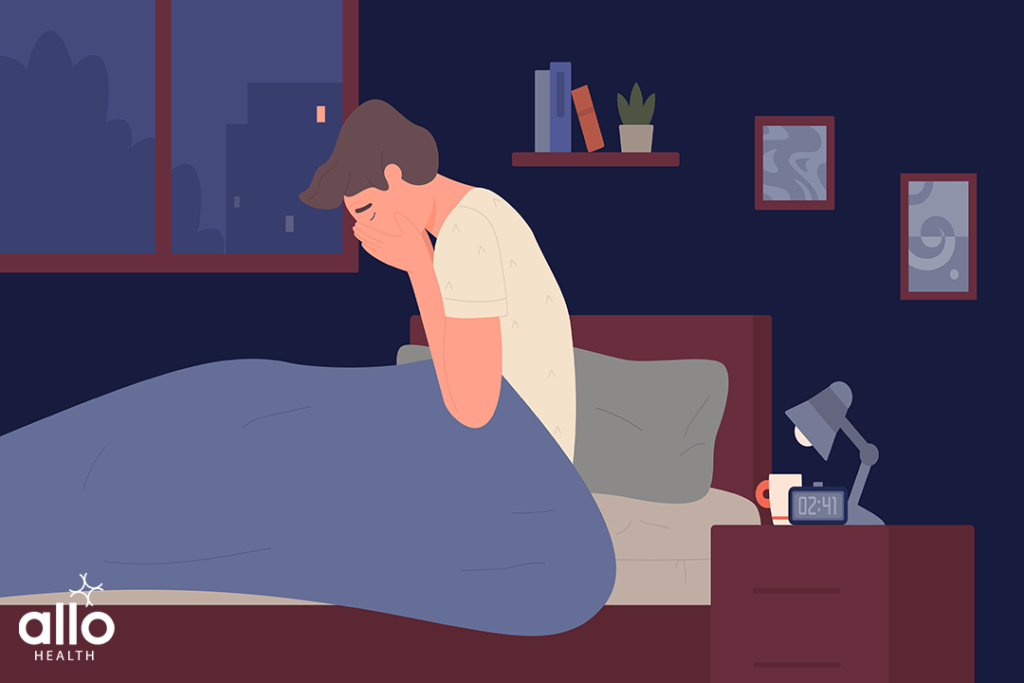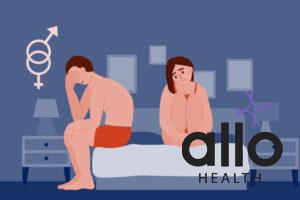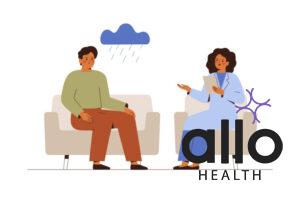Treatment For Low Libido In Males

Allo Health is dedicated to personalized well-being, offering support and trusted information tailored to individual health goals. The platform emphasizes human-generated content, led by a distinguished medical team of experts, including physicians and sexual health specialists. Their commitment to credibility involves rigorous fact-checking, authoritative research, and continuous updates to ensure accurate, up-to-date information. Allo Health's unique approach goes beyond conventional platforms, providing expert-led insights and a continuous commitment to excellence, with user feedback playing a crucial role in shaping the platform's authoritative voice.

An early career psychiatrist with extensive experience in general adult psychiatry, relationship issues, psychosexual problems & special interest in sexual medicine, disorders with addictive behaviours and Obsessive Compulsive disorders. He is an astute physician with excellent academic record and research experience. He is also a member of World Health Organisation and World Psychiatric Association. His vision and goal for Allo is an inclusive, accessible digital health clinic for psychosexual difficulties.
Why This Was Upated?
Our experts continually monitor the health and wellness space, and we update our articles when new information became available.
Updated on 18 December, 2023
- Article was updated as part of our commitment to diversity, equity, and inclusion.

"The following blog article provides general information and insights on various topics. However, it is important to note that the information presented is not intended as professional advice in any specific field or area. The content of this blog is for general educational and informational purposes only.
Book consultation
The content should not be interpreted as endorsement, recommendation, or guarantee of any product, service, or information mentioned. Readers are solely responsible for the decisions and actions they take based on the information provided in this blog. It is essential to exercise individual judgment, critical thinking, and personal responsibility when applying or implementing any information or suggestions discussed in the blog."
Low libido, commonly known as a decreased sex drive, is a prevalent concern affecting men of all ages. It can be caused by a myriad of factors, including physical, psychological, and lifestyle-related issues. However, the good news is that low libido is a treatable condition, and there are various approaches available to address this delicate matter. In this article, we will explore the options for treatment for low libido in males, aiming to help individuals regain their sexual confidence and enhance their overall well-being.
What is Low Libido?

Low libido, also known as low sex drive or hypoactive sexual desire, refers to a diminished interest or desire for sexual activity. It is a common issue that can affect both men and women at different stages of life. Individuals with low libido may experience a reduced interest in sexual thoughts, fantasies, and activities, which can lead to less frequent sexual encounters or a decreased overall interest in sex.
Causes of Low Libido in Males
Low libido in males, also known as male hypoactive sexual desire disorder, can be caused by various factors, including:
Hormonal imbalances: Testosterone is a key hormone in male sexual desire. If there is a deficiency in testosterone levels, it can lead to a decrease in libido.
Age: As men age, testosterone levels naturally decline, which can result in a gradual reduction in sex drive.
Stress and anxiety: Psychological factors like stress, anxiety, and depression can significantly impact libido by affecting mood and overall interest in sexual activities.
Medications: Certain medications, such as antidepressants, antihypertensives, and medications that affect hormone levels, can have side effects that lower libido.
Chronic health conditions: Conditions like diabetes, obesity, heart disease, and neurological disorders can contribute to low libido.
Substance abuse: Excessive alcohol consumption, recreational drug use, and smoking can negatively affect sexual desire and performance.
Fatigue and sleep problems: Lack of adequate sleep and chronic fatigue can diminish libido in males.
Relationship issues: Conflicts, lack of emotional intimacy, and communication problems within a relationship can lead to reduced sexual desire.
Body image and self-esteem: Negative body image or low self-esteem can affect sexual confidence and interest in sexual activities.
Sedentary lifestyle: Lack of physical activity and a sedentary lifestyle can have a negative impact on overall health and libido.
Pornography use: Excessive consumption of pornography can sometimes lead to a decrease in interest in real-life sexual encounters.
It is essential for men experiencing persistent low libido to consult with a healthcare professional to identify the underlying cause and receive appropriate guidance and treatment. In some cases, lifestyle changes, counseling, hormone therapy, or other medical interventions may be recommended to address the issue.
Symptoms of low libido in males
Symptoms of low libido in males may vary from person to person, but some common signs and symptoms include:
Reduced sexual desire: Men with low libido often experience a decrease in their interest or desire for sexual activity. They may find themselves less motivated to initiate or participate in sexual encounters.
Difficulty in getting aroused: Low libido can make it challenging for men to become sexually aroused, even in situations that previously elicited arousal.
Fewer sexual thoughts or fantasies: Men with low libido may notice a decrease in sexual thoughts, fantasies, or daydreams related to sex.
Lack of interest in masturbation: Individuals with low libido might have less interest in engaging in self-stimulation or masturbation.
Reduced spontaneous erections: Men may experience fewer spontaneous erections, which are typically normal physiological responses that occur without direct sexual stimulation.
Difficulty maintaining erections: Even if arousal occurs, men with low libido may struggle to maintain an erection during sexual activity.
Decreased frequency of sexual activity: Low libido often leads to a decline in the frequency of sexual encounters and intimacy with a partner.
Emotional distress: Low libido can lead to emotional distress, frustration, or a sense of inadequacy, particularly if it causes problems within a relationship.
Fatigue and lack of energy: Men with low libido may experience fatigue or a general lack of energy, which can contribute to a reduced interest in sex.
It is essential to remember that occasional fluctuations in libido are normal and can be influenced by various factors, including stress, fatigue, and relationship dynamics. However, if low libido becomes persistent or causes significant distress, it may be beneficial to consult with a healthcare professional to identify potential underlying causes and explore appropriate treatment options.
Treatment Options For Low Libido In Males

Treatment options for low libido in males depend on the underlying causes. Some of the effective treatment approaches include-
- Medications like PDE5 Inhibitors, Bupropion etc.
- Counselling or Therapy
- Lifestyle changes ( balanced diet, good sleep, stress reduction, physical activity etc.)
- Herbal Supplements
Let us understand about these treatments in detail and how can they help to alleviate the concern of low libido in males.
Medications
Medications can be considered as a treatment option for low libido in males, particularly when the cause is related to hormonal imbalances or other medical conditions. It’s important to note that medication should only be prescribed and used under the guidance of a qualified healthcare professional, and the decision to use medication should be based on a thorough assessment of the individual’s health and specific needs. Here are some medications that may be used to address low libido in males:
Testosterone Replacement Therapy (TRT):
- TRT involves the administration of synthetic testosterone to supplement the body’s natural testosterone levels. It is primarily used for men with clinically diagnosed low testosterone levels (hypogonadism).
- TRT can be administered through various methods, including gels, patches, injections, and pellets.
By increasing testosterone levels, TRT can improve libido, sexual function, and energy levels in men with low testosterone.
Phosphodiesterase-5 (PDE5) Inhibitors:
- PDE5 inhibitors, such as sildenafil (Viagra), tadalafil (Cialis), and vardenafil (Levitra), are commonly prescribed to treat erectile dysfunction (ED).
- While these medications do not directly increase libido, they can enhance erectile function by promoting increased blood flow to the penis, making it easier to achieve and maintain erections during sexual stimulation.
- Improved erectile function can indirectly boost sexual confidence and interest in sexual activities.
Bupropion:
- Bupropion is an antidepressant that has been found to have a positive impact on sexual desire in some individuals, particularly when other antidepressants are causing low libido as a side effect.
- It works by affecting the levels of neurotransmitters in the brain, which can influence sexual desire and arousal.
It’s crucial to emphasize that medication is not always the first-line treatment for low libido, especially when the cause is psychological or related to lifestyle factors. Medications should be prescribed cautiously, and their use should be regularly monitored by a healthcare professional to assess their effectiveness and potential side effects.
Before considering medication, a thorough evaluation by a healthcare provider is essential to identify the underlying cause of low libido. Depending on the individual’s health and medical history, other treatment approaches, such as lifestyle changes, counseling, or addressing underlying health conditions, may be more appropriate or used in conjunction with medication for the best results.
Counseling or Therapy
Counseling or therapy can be an effective treatment option for low libido in males, especially when the underlying cause is related to psychological or emotional factors. Here are some forms of counseling or therapy that can help address low libido:
Individual Therapy:
- Individual therapy involves one-on-one sessions with a qualified therapist or counselor.
- It can help explore and address psychological factors that may be contributing to low libido, such as stress, anxiety, depression, body image issues, past traumas, or negative sexual experiences.
- The therapist can work with the individual to identify and challenge negative thought patterns or beliefs about sex and intimacy, promoting a healthier and more positive mindset.
Couples Therapy:
- Low libido can lead to relationship issues and emotional distress for both partners. Couples therapy involves joint sessions with a therapist to address these concerns together.
- The therapist can facilitate open communication between partners, allowing them to express their feelings, needs, and concerns related to sexual intimacy in a safe and supportive environment.
- Couples can learn effective communication techniques and problem-solving skills to overcome barriers to intimacy and reconnect emotionally.
Sex Therapy:
- Sex therapy is a specialized form of therapy that focuses specifically on sexual issues and intimacy concerns.
- A sex therapist can help couples or individuals explore their sexual desires, preferences, and any challenges they may be facing in their sexual relationship.
- Sex therapy aims to improve sexual communication, increase sexual knowledge, and address any physical or emotional factors affecting sexual function and desire.
Mindfulness-Based Therapies:
- Mindfulness-based therapies, such as Mindfulness-Based Stress Reduction (MBSR) or Mindfulness-Based Cognitive Therapy (MBCT), can be helpful for individuals experiencing stress-related low libido.
- These approaches teach techniques for being present in the moment, reducing stress, and promoting overall emotional well-being, which can positively impact sexual desire.
Education and Psychoeducation:
- Psychoeducation involves providing information and education about sexual health, anatomy, and the psychological aspects of sexuality.
- Understanding how various factors, such as stress, hormones, and relationship dynamics, can influence libido can be empowering and help individuals and couples navigate their concerns.
Counseling and therapy provide a safe and confidential space for individuals and couples to explore their feelings and concerns related to low libido. These therapeutic approaches can help address both psychological and relational factors, leading to improved sexual satisfaction and overall well-being. If low libido is affecting one’s quality of life or relationship, seeking guidance from a qualified therapist or counselor can be a valuable step toward finding effective solutions and improving intimacy and sexual satisfaction.
Pelvic Physical Therapy
Pelvic Physical Therapy, also known as pelvic floor physical therapy, is a specialized form of physical therapy that focuses on the muscles, ligaments, and connective tissues in the pelvic region. While it is primarily used to address pelvic floor dysfunction, it can indirectly help treat low libido in males by addressing underlying factors that may be contributing to sexual issues. Here’s how pelvic physical therapy can be beneficial:
- Pelvic floor dysfunction can lead to various issues, such as pain, discomfort, and urinary or bowel problems. These symptoms can contribute to stress, anxiety, and overall dissatisfaction with sexual experiences. Pelvic physical therapy can help address these dysfunctions, which may indirectly improve sexual comfort and desire.
- Chronic pain or discomfort in the pelvic region can cause stress and anxiety, which can negatively impact sexual desire. Pelvic physical therapy can help reduce pain and tension in the pelvic area, leading to a reduction in stress and improved sexual well-being.
- Pelvic physical therapy may include exercises and techniques that improve blood flow to the pelvic region. Improved blood flow can support sexual function and potentially enhance libido.
- Pelvic physical therapy involves various exercises that increase awareness and control of the pelvic muscles. This improved body awareness can lead to a better connection with one’s own body, including sexual sensations and pleasure.
- Poor posture or alignment can affect blood flow and nerve function in the pelvic region, potentially impacting sexual function and desire. Pelvic physical therapy can address postural issues, which may have a positive impact on sexual health.
- Pelvic physical therapists often provide education and counseling on sexual health and function. This includes discussing concerns related to low libido and providing guidance on how to improve sexual well-being.
- Pelvic physical therapists may collaborate with other healthcare providers, such as urologists or sex therapists, to develop a comprehensive treatment plan for individuals experiencing low libido and other sexual concerns.
It’s important to note that while pelvic physical therapy can address certain physical and psychological factors related to sexual health, it may not directly treat hormonal imbalances or other medical conditions that can contribute to low libido. Therefore, a comprehensive approach involving pelvic physical therapy along with other appropriate interventions may be needed to effectively address low libido in males.
Lifestyle Changes
Lifestyle changes can be an essential and effective treatment option for low libido in males, especially when the cause is related to lifestyle factors or overall health. Here are some lifestyle changes that can help improve libido:
Regular Exercise:
- Engaging in regular physical activity can boost blood circulation, promote overall health, and increase testosterone levels, which are important for sexual desire.
- Aim for at least 150 minutes of moderate-intensity aerobic exercise or 75 minutes of vigorous-intensity aerobic exercise per week, along with muscle-strengthening activities on two or more days per week.
Healthy Diet:
- Consume a balanced and nutritious diet that includes a variety of fruits, vegetables, whole grains, lean proteins, and healthy fats.
- Foods rich in certain nutrients, such as zinc, vitamin D, and antioxidants, can support hormonal balance and sexual health.
Stress Reduction:
- Chronic stress can negatively impact libido. Practice stress-reducing techniques like mindfulness, meditation, yoga, or deep breathing exercises.
- Creating a healthy work-life balance and taking time for relaxation and self-care can also help reduce stress levels.
Adequate Sleep:
- Ensure you get enough quality sleep each night. Lack of sleep can lead to fatigue, reduced energy levels, and lower sexual desire.
- Aim for 7-9 hours of sleep per night for most adults.
Limit Alcohol and Drug Use:
- Excessive alcohol consumption and recreational drug use can lower testosterone levels and impair sexual function and desire.
- Moderating alcohol intake and avoiding illicit drug use can be beneficial for sexual health.
Quit Smoking:
- Smoking is associated with various health issues, including reduced blood flow, which can negatively affect sexual function.
- Quitting smoking can lead to improved overall health and may positively impact libido.
Maintain a Healthy Weight:
- Obesity is linked to hormonal imbalances and other health conditions that can contribute to low libido.
- Achieving and maintaining a healthy weight through a balanced diet and regular exercise can improve sexual health.
Communication and Intimacy:
- Open communication with a partner about sexual desires, preferences, and concerns is crucial for a healthy sexual relationship.
- Engaging in non-sexual forms of intimacy, such as cuddling, hugging, and affectionate touch, can strengthen emotional connection and desire.
Addressing Relationship Issues:
- Relationship conflicts or unresolved issues can impact sexual desire. Seek couples therapy or counseling to address any relationship concerns.
Remember that lifestyle changes may take time to show their effects, and it’s essential to be patient and consistent. Additionally, low libido can have multiple contributing factors, so a combination of lifestyle changes, counseling, and medical interventions (if necessary) may provide the most comprehensive and effective treatment approach. Always consult with a healthcare professional or a qualified therapist to determine the most suitable treatment plan based on individual needs and health status.
Herbal supplements
Herbal supplements are often promoted as a natural treatment option for low libido in males. While some herbal remedies have been traditionally used for their potential aphrodisiac effects, it’s important to note that the scientific evidence supporting their effectiveness is often limited and mixed.
As with any supplement, it’s crucial to consult with a healthcare professional before using herbal supplements, as they may interact with medications or have potential side effects. Here are some herbal supplements that have been suggested for low libido:
Maca Root (Lepidium meyenii):
- Maca root is a plant native to the Andes in Peru. It is believed to have aphrodisiac properties and has been used traditionally to enhance sexual desire.
- Some studies suggest that maca may have a positive impact on sexual function and desire, but more research is needed to confirm its effectiveness.
Panax Ginseng:
- Panax ginseng, also known as Asian ginseng, is a popular herb in traditional Chinese medicine.
- Some studies suggest that ginseng may have a positive effect on sexual function, including improved erectile function and sexual satisfaction.
Horny Goat Weed (Epimedium):
- Horny goat weed is an herb that has been used in traditional Chinese medicine for its potential aphrodisiac effects.
- It is believed to work by increasing blood flow to the genitals, but scientific evidence supporting its efficacy is limited.
Tribulus Terrestris:
- Tribulus terrestris is an herb commonly used in traditional medicine systems, including Ayurveda.
- Some studies suggest that it may have a positive effect on sexual desire and testosterone levels, but more research is needed to establish its effectiveness.
Yohimbine:
- Yohimbine is derived from the bark of the yohimbe tree and has been used as an aphrodisiac and to treat erectile dysfunction.
- It may improve sexual desire and erectile function in some men, but it can also have significant side effects and interactions with medications, so it should be used with caution.
It’s essential to be cautious when using herbal supplements for low libido, as the quality and purity of these products can vary, and they are not regulated in the same way as prescription medications. Additionally, some herbal supplements may interact with certain medications or have adverse effects on individuals with certain medical conditions.
Frequently Asked Questions
Q: When should I seek medical help for low libido?
A: If you are experiencing persistent or bothersome low libido that is causing distress or impacting your quality of life, it’s essential to seek medical help. A healthcare professional can help identify any underlying causes and recommend appropriate treatment options.
Q: How long does it take to see improvements in low libido with treatment?
A: The time to see improvements in low libido can vary depending on the underlying cause and the effectiveness of the chosen treatment. Some individuals may experience improvements relatively quickly, while others may require more time and a combination of treatment approaches.
Q: Is low libido a normal part of aging?
A: While it is common for libido to change with age, low libido should not be considered a normal part of aging. It is essential to distinguish age-related changes from persistent low libido that requires medical attention and intervention.
Q: Is pornography use linked to low libido in males?
A: Excessive consumption of pornography can sometimes lead to desensitization and reduced interest in real-life sexual encounters. This phenomenon is known as porn-induced erectile dysfunction (PIED) and can contribute to low libido in some individuals.
Q: Can excessive alcohol consumption lead to low libido?
A: Yes, excessive alcohol consumption can negatively impact sexual desire and performance, as it can affect hormone levels, impair nerve function, and lead to fatigue.
Q: Can relationship issues be a cause of low libido?
A: Yes, relationship issues, such as communication problems, lack of emotional intimacy, and unresolved conflicts, can contribute to low libido in males. Addressing these issues through counseling or therapy can help improve sexual desire.
Q: Can hormone imbalances affect libido in males?
A: Yes, hormone imbalances, particularly low testosterone levels, can lead to low libido in males. Hormone therapy, such as testosterone replacement therapy (TRT), may be considered for individuals with clinically low testosterone levels.
Q: Can a lack of attraction to a partner cause low libido?
A: Yes, a lack of attraction or emotional connection to a partner can impact sexual desire and contribute to low libido. Open communication and addressing concerns with a partner can be helpful in improving intimacy.







































